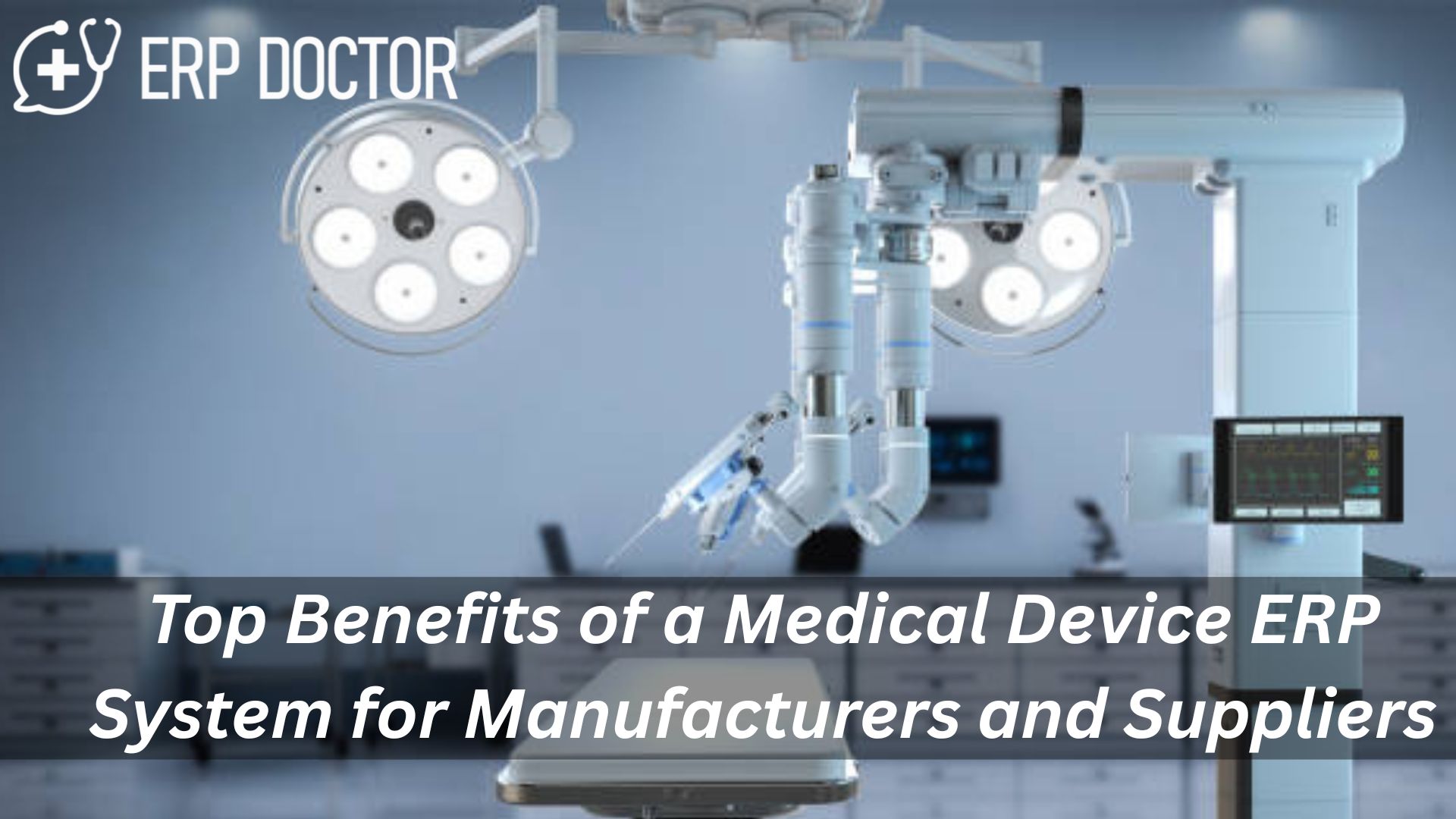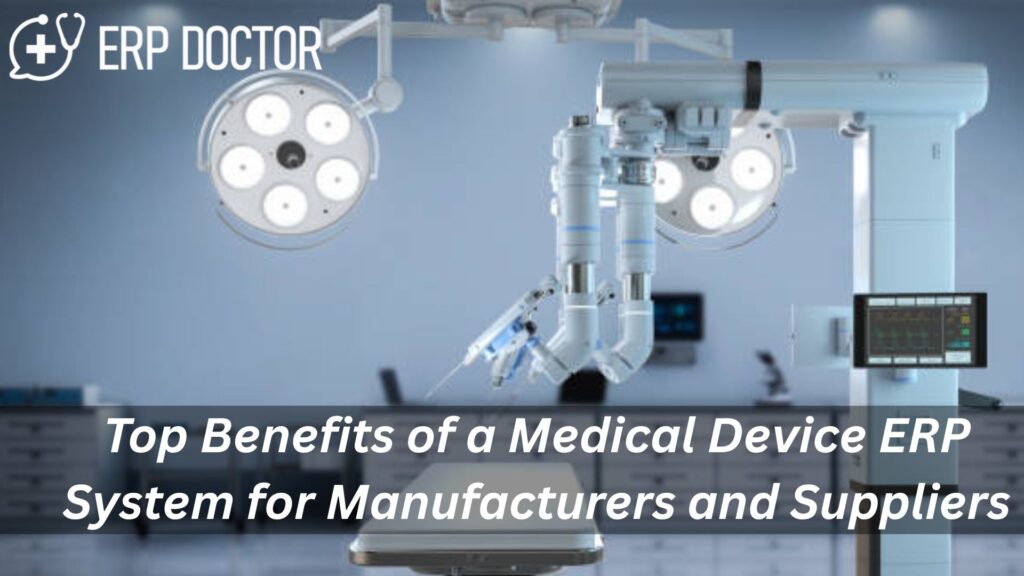
Top Benefits of a Medical Device ERP System for Manufacturers and Suppliers

Unlock Growth: Benefits of ERP for Medical Device Manufacturers
The medical devices and medical equipment industry is one of the most highly regulated sectors. Manufacturers and suppliers must balance strict compliance requirements, complex supply chains, rising costs, and the constant demand for innovation. A Medical device ERP system helps overcome these challenges by integrating operations, ensuring compliance, and boosting efficiency. Unlike generic tools, a Medical device ERP software is tailored to industry-specific needs, giving companies the agility to stay competitive.
1. Regulatory Compliance and Quality Control
For ERP for medical device manufacturers, compliance is non-negotiable. A Medical device ERP system comes with built-in compliance features for FDA, ISO, and CE standards. It automates documentation, maintains complete audit trails, and ensures strict quality checks at every stage of production—reducing the risk of costly penalties or recalls.
2. Streamlined Supply Chain Management
The supply chain for medical devices and medical equipment is highly complex. With an enterprise resource planning system, manufacturers gain real-time visibility into suppliers, logistics, and inventory. A Medical device ERP system ensures that stockouts are minimized, procurement is optimized, and critical devices reach the market faster.
3. Improved Product Traceability
Traceability is a top priority in the medical industry. A Medical device ERP software provides end-to-end product traceability—from raw materials to finished medical equipment. In the event of recalls or defects, manufacturers can quickly identify affected batches and resolve issues with minimal disruption.
4. Enhanced R&D and Innovation
By integrating data across departments, a medical device ERP system accelerates research and development. Teams gain access to insights on customer needs, market trends, and production feasibility. This not only speeds up innovation but also ensures that new medical devices comply with stringent regulations.
5. Cost Efficiency and Resource Optimization
A robust enterprise resource planning system automates routine tasks like inventory management, purchase orders, and reporting. For ERP for medical device manufacturers, this means fewer manual errors, reduced operational costs, and smarter resource allocation—allowing companies to focus more on growth and innovation.
6. Better Customer and Supplier Collaboration
A Medical device ERP system enhances collaboration across the value chain. With built-in CRM modules and supplier portals, manufacturers can stay aligned with customer needs while suppliers get real-time visibility into demand and quality requirements. This leads to stronger partnerships and more reliable supply chains.
7. Real-Time Data and Analytics
Medical device companies need data-driven decisions. A Medical device ERP software provides powerful dashboards and analytics to track compliance, sales, service efficiency, and financial performance. Decision-makers can respond proactively, and design strategies based on real-time business intelligence.
To Sum It Up
For medical device manufacturers and suppliers, a medical device ERP software is no longer optional—it’s essential. From ensuring compliance and improving supply chains to driving cost efficiency and supporting innovation, the right ERP for medical device manufacturers empowers businesses to thrive in a complex healthcare landscape. Whether producing advanced medical equipment or managing supplier networks, ERP delivers the competitive edge the industry needs.
FAQs
1. What is a Medical device ERP system?
It’s an enterprise resource planning system designed for medical device manufacturers and suppliers to streamline compliance, operations, and innovation.
2. How does a Medical device ERP system support compliance?
It automates documentation, maintains audit trails, and ensures FDA, ISO, and CE standards are met with built-in quality checks.
3. Why is ERP important for medical device manufacturers?
ERP for medical device manufacturers integrates processes, reduces manual errors, and improves efficiency across supply chain, production, and compliance.
4. Can a Medical device ERP software improve product traceability?
Yes. It provides end-to-end visibility from raw materials to finished medical equipment, making recalls and quality checks faster and easier.
5. Is a Medical device ERP system suitable for small businesses?
Absolutely. Scalable ERP solutions make it possible for even small manufacturers or service providers to benefit from automation and compliance.
6. How does ERP optimize the supply chain in medical equipment manufacturing?
It tracks inventory, demand, and supplier performance in real time, reducing stockouts, delays, and excess inventory.
7. What role does ERP play in R&D and innovation?
By centralizing data, a Medical device ERP system provides insights into trends and feasibility, helping teams accelerate compliant product development.
8. Can a Medical device ERP system integrate with finance and CRM tools?
Yes. ERP integrates with finance, CRM, and other business tools to deliver a 360° view of operations.
9. How does ERP reduce costs for medical device companies?
It automates manual tasks, streamlines resource allocation, and eliminates inefficiencies, resulting in significant cost savings.
10. What are the top benefits of using ERP for medical device suppliers?
Suppliers gain better demand forecasting, stronger collaboration with manufacturers, and improved compliance with industry standards.
Empower your medical device business with a smart ERP system—book a free consultation today!







